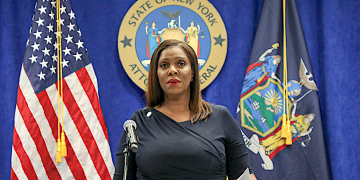Some 20 members of the immigrant community met with U.S. Sen. Richard Blumenthal on Jan. 9 to ask him to reject President-elect Donald Trump”™s Attorney General nominee Jeff Sessions, the Republican senator from Alabama. Though Blumenthal, a Democrat, did not say which way he would vote, he told the crowd, “I believe the attorney general of the United States has to be a champion of civil rights and what is right.”
The group was put together by the Connecticut Immigrant Rights Alliance. Carlos Moreno, spokesman for the group, told the Business Journal that Blumenthal”™s declining to say how he would vote was not a disappointment.
“He”™s been very clear about feeling the need to give (Sessions) an appropriate vetting, to give him a chance to address the issues that surround him,” Moreno said.
The immigrant community “has a lot of fear and uncertainty, not just here in Connecticut,” Moreno said, “and not just about Mr. Sessions, but also about Donald Trump.”
In addition to Trump”™s repeated statements about building a wall between the U.S. and Mexico and about banning Muslims from entering the country, the alliance and others have concerns about remarks Sessions made that came to light during his 1986 Senate Judiciary Committee hearings.
President Ronald Reagan had nominated Sessions to be a judge for the U.S. District Court for the Southern District of Alabama. During those hearings, Department of Justice attorney J. Gerald Hebert testified that Sessions had called the NAACP and ACLU “un-American” and “Communist-inspired” because they “forced civil rights down the throats of people.”
Thomas Figures, a black former assistant U.S. attorney, also testified that Sessions had called him “boy” and had said he thought the Ku Klux Klan was “OK, until I found out they smoked pot.”
Sessions denied those incidents, but failed to win approval.
Moreno said his group had suggested to Blumenthal ”“ who serves on the Senate Judiciary Committee, which began hearings on the Sessions nomination on Jan. 10 ”“ to ask Sessions about his public support of Trump”™s move to end birthright citizenship, his long-held opposition to voting rights and his involvement with what Moreno called “hate groups” or fronts for hate groups, such as the Federation for American Immigration Reform.
Blumenthal followed through on the last suggestion, asking Sessions why he accepted the Franklin Society Award from the Federation for American Immigration Reform, whose founder John Tanton has expressed hopes that the U.S. would maintain a majority white population; accepted the David Horowitz Freedom Award, whose namesake has said “all Muslims are connected to the (radical) Muslim Brotherhood,” according to Blumenthal; and from the Center for Security Policy, which the Southern Poverty Law Center has described as “one of America”™s most notorious Islamophobes.”
Sessions replied that he was unaware of such activities and remarks, while Blumenthal noted that the nominee had not included those awards on the questionnaire he filled out for the Judiciary Committee.
Blumenthal told the Connecticut Immigrant Rights Alliance: “Your coming to me here along with others is very important to me, because I want to take back to Washington the questions you have, so I can ask him whether he will really protect the American people. (Sessions”™) stands on many issues are out of the mainstream of modern America ”¦ on immigration rights, on women”™s health care, on voting rights ”¦ I have very, very serious concerns.”
















